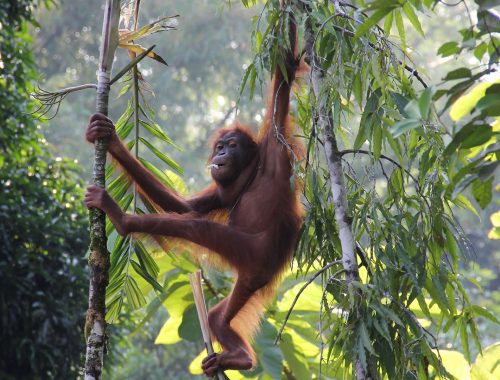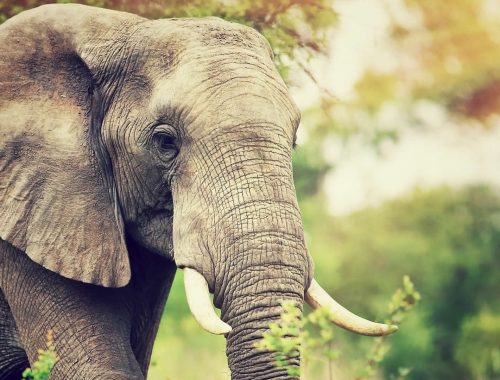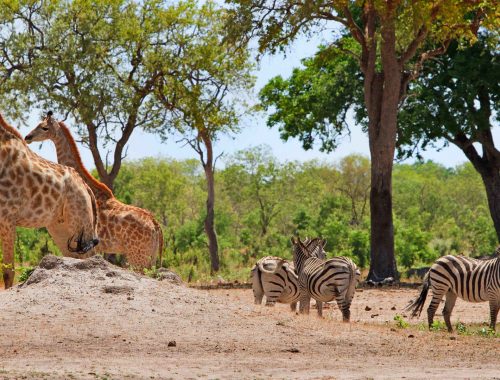
Volunteer With Monkeys In South Africa
Baboons a plenty here! Help nurture tiny infants in their early stages before the natural progression to surrogate baboon mothers. Become a key member of the team and support orphaned and mistreated primates on a journey back to life in the wild.
Duration: 2 weeks – 12 weeks
Dates: Throughout the year
Arrival day: Monday
Return day: Monday
Eligibility: General level of fitness required
Age: 18+
Share with friends...
Highlights
- Fantastic experience to work alongside vets and learn about primate care
- Know your donation is going towards the costly, yet hugely rewarding release missions
- Showering outdoors with nothing above you but the leaves and the trees and the wild sounds of Africa
- Working with other people from around the world to give animals freedom – the greatest of all gifts
- Bonding with and feeding infants before they join a surrogate female
- Add a conservation career course to support and apply for jobs after your trip
Find out where the saying “cheeky monkey” originates from in this life-changing baboon rehabilitation centre in South Africa‘s wild bushland. Become an instant member of this close community of volunteers in their great mission to rescue, rehabilitate and release.
Run by dedicated animal welfare experts since the early 2000s, the team commit to educating locals as well as volunteers about the importance of finding solutions to wildlife/human conflicts which is sadly happening all over the world. By doing this, people and primates are able to co-exist peacefully with locals appreciating, desiring and undertaking the responsibility to protect their wildlife for future generations.
Specialist facilities include:
- 4 semi-wild enclosures
- An environmental education centre
- Outdoor classroom
- Quarantine facilities and an orphan quarantine nursery
- Bonding enclosures
- Veterinary clinic
Many take the popular option of visiting the world famous Kruger National Park as part of their experience. We provide a seamless one day/ two night Kruger Safari with all transfers, breakfast and dinners, and luxury accommodation included.
All tasks undertaken here are demand-driven, and these can vary throughout the year and depending on whether a release is imminent. Actual tasks that you might help in are as follows:
- Daily food prepping shifts in the milk Kitchen
- ‘Troop cleans’ involve maintaining enclosures through adding new enrichments, hay and and mucking out
- Feeding of other animals at the centre including rabbits, guinea pigs, chickens, snakes and lizards
- Making enrichments and watching the baboons receive enrichments
- Enjoy spending time grooming older baboons who cannot be released
- Taking care of any nursery orphans in the nursery quarantine
- If any infants are in the process of being bonded to an adult baboon surrogate, the volunteers will help facilitate their relationship building in purpose built bonding enclosures
- Monitoring – join staff to observe and learn more about baboon behaviour / social structures / troop dynamics
- The Big 5 reserve offers game drives, sundowners at the Picnic Spot, river trips for wildlife spotting and sometimes taking the babies to the river
- Helping to prepare for current and future releases
- Helping and observing in the veterinary clinic
This work is crucial, as it allows for the smooth running of the centre and means that more baboons in distress can be cared for. Whilst monkey volunteering involves interaction with the primates, it is important to remember that you will not always be handling baboons.
Are you looking for paid work in the conservation sector after volunteering or interning? Oyster have teamed up with our friends at Conservation Careers who support people to find paid work in conservation following study or a career change. You can add their fantastic and flexible course to your volunteering trip with Oyster. Your Oyster experience will help add interest to your conservation resume as an eye catching addition to your job applications in future!
- Expect to share one of 6 bedrooms, each with 3 beds in the volunteer village
- The volunteer village was built in 2014. It is basic but very comfortable and welcoming
- In the volunteer village there is hot running water and 2 showers (these are open top and most volunteers love showering under the sky, and has been noted as a highlight!). Basin areas, 2 flushing toilets and a small personal kitchen for in between meal times and personal use / personal food storage. Here you will find a microwave, kettle, toaster, fridge, freezer and safe drinking water
- The volunteer village and ‘Phase 1’ facilities (clinic, nursery, education centre, milk kitchen and bonding enclosures) are all within an electric fenced area in a Big 5 Nature Reserve. It keeps the lions / leopards / elephants and wild baboons out (nothing can keep the vervets out however!)
- The ‘Phase 2 Rehab Area’ is outside of this. This is safe to work in during the day as it is very busy with lots of people and enclosures. Occasionally elephants walk through which is a massive highlight. Volunteers are always accompanied by a long-term volunteer or staff members in the Phase 2 areas for safety reasons. In the Phase 2 areas are baboons which are no longer in the hands-on contact phase. Volunteers will help enrich their enclosures with branches and new swings etc. and also clean the enclosures out (hose / water / scrub brushes) and replace with fresh hay
- Laundry; there is a communal washing machine (including detergent), somebody can do the washing or you can do it yourself
- Breakfast, lunch and dinner at the “Education Centre”
- Breakfast is cereal / toast / butter / jam / peanut butter (soya and dairy milk) for volunteers to do DIY (tea / coffee / sugar station)
- Lunch and dinner; menu / ingredients prepared by long term volunteers and they take turns to cook the communally
- Food is vegetarian, mainly vegan, but cater for gluten free / allergies within reason
- Meat products are allowed onsite, they are just not provided and the team ask that they are kept in the personal kitchen in the volunteer village
Travel arrangements
Airport: Fly to Hoedspruit (HDS) for direct airport collection and drop off
Arrival day: Monday – lunchtime flights preferable
Departure day: Monday — lunchtime flights preferable
Supporting You

Stephen has a Batchelor of Science in Animal Care from the University of Aberdeen and he has been in working with the baboons since 2003. Stephen now runs the centre with his partner Samantha, they live onsite with their daughter Sophia. Samantha has a Master of Science in Primate Conservation from Oxford Brookes University and fell in love with the baboons when volunteering in 2006 as part of her BA studies. Both are dedicated and passionate about the welfare of the baboons in their care. They are committed to the development and expansion of the centre, and the opportunity to give each baboon a chance of rehabilitation and safe freedom.
Included
- Access to your own personal ‘My Oyster’ account – our online portal where you can find out much more about the program and manage your booking
- Dedicated contact time with an experienced destination manager to discuss the project, answer any of your questions and for us to find out more about you
- Help and advice from our UK office before arrival and whilst you are away
- Pre-departure information covering medical, safety and project advice
- Gold level, 24/7 Pharos crisis management and incident support cover
- Financial protection: ATOL (if we book your flights).
- Thorough orientation on arrival
- In-country support
- Accommodation (see the ‘accommodation’ section above for details)
- Advice on visa requirements
- Oyster plants a tree in Africa with TreeAid to help reduce the impact of global carbon emissions
- Airport transfers
- Breakfast, lunch and dinner
- Bed linen
- Transport to town on frequent trips
- Your fee to Grietjie Nature Reserve
On your return:
- Welcome home pack
- Certificate of Recognition (on request)
- References (on request)
Not Included
- Flights – as an ATOL bonded company, Oyster can book flights for you
- You need a valid passport that meets the requirements of the country you will be travelling to
- Insurance (covering your time with Oyster and any planned independent travel)
- Any costs associated with changing your return flight date if you need to
- Independent travel costs
- Home country travel costs
- Spending money for additional trips, food and entertainment
- Money to buy meat if you would like to purchase this separately
- £18 for t-shirt deposit (refunded onsite)
- Airport transfers on request
More Information
You will be given an in depth volunteer guide and training sheet.
There will be presentations and tours on arrival, separate uniform is required for cleaning shifts and nursery shifts.
- Day 1 afternoon arrival consists of a general tour
- Day 2: Welcome presentation, Phase 1 tour
- Day 2: Baboon behaviour presentation, Phase 2 tour
- Day 2: Baboon film
- Day 2: Introduction to general shifts; Milk and Food Prep and Phase 1 animals (non-primate). These are rabbits, guinea pigs, chickens, lizards and snakes (optional)
- From there on other films are shown. Phase 1 presentation, river safety tour, tracks and signs at the river – often there are various wild animal tracks / signs which makes this a fun activity!
- General shift work everyday as below
SHIFTS
- TROOP CLEAN; Enclosure cleaning
- FEED SACKS / FOOD PREP; Daily food prepping shifts in the Milk Kitchen
- Milk Bottles; Making milk formula for the infants
- ENRICHMENT; Making and watching the baboons receive enrichments
- NURSERY; Taking care of any nursery orphans in the nursery quarantine
- RABBITS / GUINEA PIGS; which have been companion animals in the past for porcupine babies and wart hog babies, but also so that any incoming groups of school children can be taught “Animal Kindness” and have hands-on contact
- SNAKES / LIZARDS; If the volunteer isn’t afraid they can help take care of the snakes (rescued exotics) which also aid to teach children and adults to respect and value their ecological role
- CHICKENS; they keep the bugs in balance. They need caring for; letting out in the morning and putting them to bed at night. Night beds need cleaning out and animals fed
- BONDING; If any infants are in the process of being bonded to an adult baboon surrogate, the volunteers will help facilitate their relationship building in purpose built bonding enclosures.
- MONITORING; Volunteers can join experienced staff to observe and learn more about baboon behaviour, social structures and troop dynamics
Normally young babies come into the centre having lost their family. The team nurture the baby back to health with the support of volunteers and a surrogate human ‘mum’. From around 12 weeks old start, the team start to bond the baby to a new baboon mother (again supported by volunteers).
Once bonded (this takes about 1 month), they return baby and surrogate to the female’s troop and integrate them. It’s an emotional but very rewarding process. Troops are fully formed through bonding orphaned baboons with troops ranging from 15-30 primates.
When ready, the team release the troops nearby with much monitoring and observation. They are often visited to see how they are getting on throughout the coming years.
Baboons are born throughout the year and so there can be baby baboons at all times. The team nurture whatever primate needs it, they rescue young infants based on this rather than for volunteer ‘experience’. The typical monkey sanctuary volunteer and monkey conservation aims have changed in recent years and the experience at this rehabilitation project always prioritizes the needs of the primate – which is the way we believe volunteering should be!
Hopefully you will be able to help feed and bond with very young baboons at the centre, however this is not guaranteed. Babies are moved to surrogates following this process in order to help them gain as much nature skill and knowledge as possible for rehabilitation into the wild.
Oyster assesses projects carefully to ensure that they offer high standards of animal welfare and environmental practice. We also check that volunteers understand key points of good practice before working with animals. We do not offer a ‘cuddling’ volunteering experience, this project is about helping the primates. Hands on experience is a privilege, and something that many volunteers are able to partake in. To find out more, see our animal welfare policy.
Whilst late-availability is possible, we would advise booking as soon as you can to guarantee your ideal dates. Our projects are very popular and spaces can fill up several months in advance, especially for the months of July to September.
We are an approved activity provider for the Duke of Edinburgh’s Award. You are able to put the time that you spend volunteering abroad on this project towards achieving your Gold Duke of Edinburgh’s Award. We are happy to sign off your completion of this programme to show that you have achieved the Residential section of the Gold Award.
November – March: Summer. Temperatures reach into the 30s (celsius) during the day, and don’t fall much below 20 degrees at night time. There is the highest annual rainfall at this time of year, averaging between 5 and 7cm per month.
April – May: Autumn. Temperatures reach into the late 20s (celsius) during the day, but can fall as low as 10 degrees at night time. The average rainfall is about 2cm per month.
June – August: Winter. Temperatures reach up to the early 20s (celsius) during the day, but can fall as low as 5 degrees at night time. There is almost no rainfall at this time of year.
September – October: Spring. Temperatures range from mid to late 20s (celsius) during the day, and fall between 10 – 15 degrees at night time. There is nominal rainfall at this time of year, between 1 and 4cm of rain per month on average.
We would recommend budgeting up to £25 per week to include snacks and souvenirs. Larger trips should be budgeted separately. Please bring cash to the centre as you will not have access to ATMs or card machines in most cases.
- £18 for t-shirt deposit (refunded onsite)
There is really easy access to cash machines in the local town so you do not need to take all your cash with you.
If you are going for over 4 weeks, you might like to consider getting a cash card. Cash cards are a safe and convenient way to take your money travelling with you – they act just like debit cards but do not have the same fees as you might have to pay on your bank cards from home. Check out our blog for details on how the card works here.
No visa is necessary for under 90 days from UK and most western European countries. You will receive a tourist stamp upon arrival allowing you stay in the country for free for up to 90 days.
You need to make sure your passport is valid for a minimum of 30 days after you leave South Africa.
Most of our volunteers are independent travellers and you will become part of a group of people from around the world here. It is fine to travel with friends or as part of a small group too however- more the merrier!
The simple answer to this question is, yes absolutely!
It is important to bear in mind however that this may not be like other holidays that you have taken. Remember that you are volunteering, and this means that you will be put to work! This sort of holiday is a world away from sun loungers and cocktails, with our volunteers often heading home tired but immensely satisfied. If you think that you will need a bit of relaxing time on your trip too, do make sure to factor this in when your time on the project is complete.
You will need to show evidence of having had a TB vaccine (often called a BCG). Most children in the UK have these in year 5 or 6, so it should be easy to get evidence; however in Europe many countries have stopped giving them so please check with your doctor to see if you have had it or not. If you haven’t had one already you can choose to get the vaccination, or show evidence of a recent negative TB test instead.
For all other travel vaccinations, you should visit your doctor or travel nurse to find out what you will need. Your routine vaccinations will need to be up to date; hepatitis A and Typhoid are likely. You should follow your doctor’s advice.
Please check below for where the closest hospital to the project is – your doctor may ask to know this so that they can provide information on rabies.
For any more information, including entry requirements, please see the Fit for Travel website or the UK government’s travel advice page for South Africa.
Marula Med in Phalaborwa (emergency centre) – 45-60 minutes. Closest large hospital is the medi clinic in Tzaneen – 1.5 hours
Safety is of paramount importance to us. Before your departure you will be given a full briefing and will be given information on how to stay safe. We have chosen programmes in areas which do not have safety concerns, but we do monitor the situation and follow advice from the UK government. There are excellent staff members on the ground who ensure that our volunteers stay safe. Having said all this it is of course your responsibility to make sure that you are careful and follow guidance on safety. Due to the rural location of this programme you live on site with other volunteers and staff and when you leave the centre you travel with a member of staff.
The centre is in a very secure and safe area. The project is located in rural South Africa, approximately 7 hours north of Johannesburg. It is a beautiful and unspoilt area.
The town is 1 hour away on a good road. It has all you need – shopping malls, banks, lively places to eat and drink and good medical facilities. There is a weekly trip.
Hoedspruit is about 1.5 hours away. As there are regular pick ups in Hoedspruit, there is often a town trip to Hoedspruit as well.
The project is ‘in the bush’ so it’s patchy and they can experience load shedding (no power). But generally it’s good enough for volunteers to message.
The project is ‘in the bush’ so it’s patchy and they can experience load shedding (no power). But generally it’s good enough for volunteers to message.
South Africa is 2 hours ahead of GMT (GMT +2)
A special South African three pin plug can be purchased at most airports and travel stores. European sockets are also prevalent.
There are no set days off at the centre but you should expect to have one day off per week.
A few examples of things that you might be able to get involved in are below. Please note, you should not expect to do any lots of trips if you are staying for minimal time.
- The Kruger tour arranged by Oyster
- Panorama Tour; a tour of the panorama route
- Nourish Eco-Village Visit; to visit a community project / childrens creche
- HALO Outreach; you can join every other Saturday to do dog health clinics (health checks, dipping for ticks / fleas / vaccinations)
- Days off can be taken at the lodge next door (pay for use of the pool for the day but take your own food / drinks) or you can be dropped off at a Bar / Pool just outside of the reserve where you can use the pool for free as long as youbuy food / drinks from the menu)
- Olifants Riverboat Safari and dinner; every other Wednesday
- Reptile Park visit
- Moholoholo tour
- Vervet Monkey Foundation
- Jane Goodall Chimp Eden
Supervision will be fairly intensive during the first few days, when you will receive a thorough induction and work-related training. Once you are comfortable with things, you might not always have a supervisor working alongside you, but there will always be staff and other volunteers around to help, and you will always be accompanied for any high risk activities.
Staff at Oyster’s head office and in-country will be responsible for your safety and welfare while you are at the project. This will start from the moment you are picked up from the airport until the time you are dropped back there. Before and after these times, you will be outside Oyster’s responsibility and should make sure that you act safely and avoid risk. This is also true if you choose to leave the project during your time off. We will give you plenty of guidance and advice about this.
Oyster has personally hand-picked some of the best volunteering projects out there. With so much amazing choice, it can be hard to make a decision. Have a look at our guide to help you to choose the best animal volunteering project for you.
Project Reviews
Find out what Oyster volunteers have said in these reviews of our baboon rehabilitation programme in South Africa:
 "Really enjoying it. It’s been a great week. We have five rescued baby baboons and this week the center is short staffed so they asked me to be a surrogate mother to one of them so all very exciting. On top of that the first day we witnessed a pride of lions finishing a kill by the river, as well as seeing twice a pack of wild dogs, giraffes, elephants, warthog, impala among others I don’t know the names of. Tomorrow I’ve signed up to go on a day safari with them along with two other volunteers!"
"Really enjoying it. It’s been a great week. We have five rescued baby baboons and this week the center is short staffed so they asked me to be a surrogate mother to one of them so all very exciting. On top of that the first day we witnessed a pride of lions finishing a kill by the river, as well as seeing twice a pack of wild dogs, giraffes, elephants, warthog, impala among others I don’t know the names of. Tomorrow I’ve signed up to go on a day safari with them along with two other volunteers!"
Avena, Nov 2024
Find out what Oyster volunteers have said in these reviews of our baboon rehabilitation programme in South Africa:
 "Really enjoying it. It’s been a great week. We have five rescued baby baboons and this week the center is short staffed so they asked me to be a surrogate mother to one of them so all very exciting. On top of that the first day we witnessed a pride of lions finishing a kill by the river, as well as seeing twice a pack of wild dogs, giraffes, elephants, warthog, impala among others I don’t know the names of. Tomorrow I’ve signed up to go on a day safari with them along with two other volunteers!"
"Really enjoying it. It’s been a great week. We have five rescued baby baboons and this week the center is short staffed so they asked me to be a surrogate mother to one of them so all very exciting. On top of that the first day we witnessed a pride of lions finishing a kill by the river, as well as seeing twice a pack of wild dogs, giraffes, elephants, warthog, impala among others I don’t know the names of. Tomorrow I’ve signed up to go on a day safari with them along with two other volunteers!"
Avena, Nov 2024
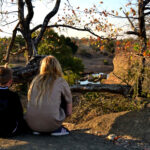 "We had a great time at the project. Their ethical practices are world class. Our kids left there amazed by what they achieved and were involved in. In terms of your assistance, we couldn’t ask for more. Sincere thanks from all of us."
"We had a great time at the project. Their ethical practices are world class. Our kids left there amazed by what they achieved and were involved in. In terms of your assistance, we couldn’t ask for more. Sincere thanks from all of us."
Paul, Alycia and family, Dec 2023
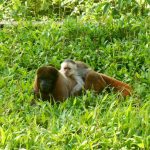 "Reliable and friendly follow-up from Kate throughout the entire process for volunteering in South Africa. Security for assistance with all necessary details. Good information. Easy website. I can really recommend Oyster Worldwide and I would definitely choose them again. The project has a really serious and high methodical standard in all they do for the baboons. I am impressed. It's hard work, and really meaningful to be part of it."
"Reliable and friendly follow-up from Kate throughout the entire process for volunteering in South Africa. Security for assistance with all necessary details. Good information. Easy website. I can really recommend Oyster Worldwide and I would definitely choose them again. The project has a really serious and high methodical standard in all they do for the baboons. I am impressed. It's hard work, and really meaningful to be part of it."
Frida, August 2024
 "We had a great time at the project. Their ethical practices are world class. Our kids left there amazed by what they achieved and were involved in. In terms of your assistance, we couldn’t ask for more. Sincere thanks from all of us."
"We had a great time at the project. Their ethical practices are world class. Our kids left there amazed by what they achieved and were involved in. In terms of your assistance, we couldn’t ask for more. Sincere thanks from all of us."
Paul, Alycia and family, Dec 2023
 "We had a very special experience at this project, one that we will hold in our hearts forever and one we hope to repeat one day. I found all of the pre-travel information easy to access and very informative. Safe to say we entered this experience with some trepidation never having been to South Africa or done this sort of thing before, but I felt so well prepared and even better, fully supported every step of the way. I loved the My Oyster portal where I could collect all the information in one place at my own pace. You were responsive to my questions, the transition to SA team was painless and we had all the information we needed at every step. The experience itself was like nothing else. Travelling with children (11 and 8) on my own to a country I only knew through what the media has shown me was, I was on high alert but as soon as we arrived and met the team, I relaxed knowing I had nothing to worry about. We were going to be safe and that was such a relief (and quite rare for me!). The family who run the business were so welcoming, easy going yet exuded a sense of professional strength. It was well organised, clean (as best it can be being in the African bush!) and easy to fit into. The biggest surprise I think for all of us, was how well the children adapted. Their abilities were considered but also encouraged and I witnessed them step into their own in a way I could never have imagined back in the UK. The variety of tasks we were given was interesting and the education we received along the way was well received. I think our favourite part was being able to get out into the community and witness and get involved in the work they do. Actually, if you asked the girls, their favourite part was playing with the rabbits and guinea pigs with Sophia! It's a very special place and the whole experience was seamless. I totally switched off and relaxed which is really hard for me to do but I knew I was in safe hands and everything was taken care of. So thank you, I hope to be in a position to book another adventure through you one day. We are definitely explorers now! "
"We had a very special experience at this project, one that we will hold in our hearts forever and one we hope to repeat one day. I found all of the pre-travel information easy to access and very informative. Safe to say we entered this experience with some trepidation never having been to South Africa or done this sort of thing before, but I felt so well prepared and even better, fully supported every step of the way. I loved the My Oyster portal where I could collect all the information in one place at my own pace. You were responsive to my questions, the transition to SA team was painless and we had all the information we needed at every step. The experience itself was like nothing else. Travelling with children (11 and 8) on my own to a country I only knew through what the media has shown me was, I was on high alert but as soon as we arrived and met the team, I relaxed knowing I had nothing to worry about. We were going to be safe and that was such a relief (and quite rare for me!). The family who run the business were so welcoming, easy going yet exuded a sense of professional strength. It was well organised, clean (as best it can be being in the African bush!) and easy to fit into. The biggest surprise I think for all of us, was how well the children adapted. Their abilities were considered but also encouraged and I witnessed them step into their own in a way I could never have imagined back in the UK. The variety of tasks we were given was interesting and the education we received along the way was well received. I think our favourite part was being able to get out into the community and witness and get involved in the work they do. Actually, if you asked the girls, their favourite part was playing with the rabbits and guinea pigs with Sophia! It's a very special place and the whole experience was seamless. I totally switched off and relaxed which is really hard for me to do but I knew I was in safe hands and everything was taken care of. So thank you, I hope to be in a position to book another adventure through you one day. We are definitely explorers now! "
Catherine and daughter, 2 weeks June 2023
 "I just got back home yesterday! I had the best time on my trip and I was so sad to be leaving. Thank you for all of the help you provided, everything went smoothly and I might even return in the future!"
"I just got back home yesterday! I had the best time on my trip and I was so sad to be leaving. Thank you for all of the help you provided, everything went smoothly and I might even return in the future!"
Briana, June 2023
 " We would highly recommend this project to anyone wanting an ethical and wholesome experience. A++ . We are enjoying ourselves and working hard for the cause! The people who manage this place are so kind and caring and such hard workers. They go out of their way to assist and make it the best experience for you. It feels like one big family when you volunteer here. It has been a very rewarding experience and so nice to be able to help out to these precious baboons, Guinea pigs, rabbits, dogs, cat , chickens and even Lemon the friendly turkey! We cannot forget the adorable Bush Baby. We loved this experience and it will be a memory we will cherish the rest of our lives!!! "
" We would highly recommend this project to anyone wanting an ethical and wholesome experience. A++ . We are enjoying ourselves and working hard for the cause! The people who manage this place are so kind and caring and such hard workers. They go out of their way to assist and make it the best experience for you. It feels like one big family when you volunteer here. It has been a very rewarding experience and so nice to be able to help out to these precious baboons, Guinea pigs, rabbits, dogs, cat , chickens and even Lemon the friendly turkey! We cannot forget the adorable Bush Baby. We loved this experience and it will be a memory we will cherish the rest of our lives!!! "
The LeClair and Nicholds families, 2 weeks May 2023
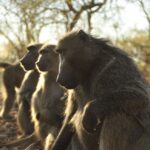 "This is a truly magical place! :) Really enjoying it and learning a lot about baboons. 2 weeks isn't enough; I wish I booked 3 weeks :) The other volunteers are friendly. Food is pretty plentiful (somewhere mentioned we should buy extra if we ate a lot, but it's been fine). Had an excursion yesterday and should be doing one more before safari. :) "
"This is a truly magical place! :) Really enjoying it and learning a lot about baboons. 2 weeks isn't enough; I wish I booked 3 weeks :) The other volunteers are friendly. Food is pretty plentiful (somewhere mentioned we should buy extra if we ate a lot, but it's been fine). Had an excursion yesterday and should be doing one more before safari. :) "
Gemma, 2 weeks January 2023
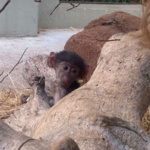 "As soon as I arrived I had a brief but in depth tour of the phase 1 area by Jo who was super friendly and smiley. Everyone there was super nice so you’ll fit in easily and there's always enough people to be with or not if you like to be alone! After lunch I had 2 nursery hours, meeting the older baboon called Patats. There were two babies there during the days I volunteered. Stella will start bonding soon so she’s with a surrogate mother to help encourage the baboons into their natural state early on. They have a designated area for the babies and pair human mums to sleep with and take care of them but everyone spends time with them in the nursery area during the day. The most amazing part is that it is in Kruger National park with wild animals all around! We saw elephants, wild bore and baby gazelles in just the two days I was there. I felt very safe and looked after at this centre "
"As soon as I arrived I had a brief but in depth tour of the phase 1 area by Jo who was super friendly and smiley. Everyone there was super nice so you’ll fit in easily and there's always enough people to be with or not if you like to be alone! After lunch I had 2 nursery hours, meeting the older baboon called Patats. There were two babies there during the days I volunteered. Stella will start bonding soon so she’s with a surrogate mother to help encourage the baboons into their natural state early on. They have a designated area for the babies and pair human mums to sleep with and take care of them but everyone spends time with them in the nursery area during the day. The most amazing part is that it is in Kruger National park with wild animals all around! We saw elephants, wild bore and baby gazelles in just the two days I was there. I felt very safe and looked after at this centre "
Mia, 1 week Dec 2022
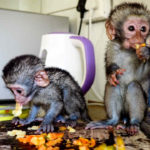
" I’m having a great time here! Being with the monkeys is amazing and the people here are really helpful. They always make me gluten free options in all the meals."
Danna, 14 days November 2022
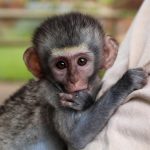 "I had a lot more contact with Oyster whilst I was away than I expected which really helped to solve ant problems and made me feel more secure. I loved that every day was different and unexpected!"
"I had a lot more contact with Oyster whilst I was away than I expected which really helped to solve ant problems and made me feel more secure. I loved that every day was different and unexpected!"
"Thank you for what she describes as a wonderful, memorable trip, and for making Hannah feel safe during her first solo adventure. Much appreciated from a caring father ;)"
Hannah and Kevin, 10 days Sept 2022
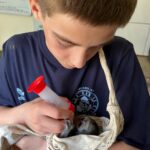 "What a fantastic experience from top to bottom. I'm honestly having a hard time transitioning back to my "real life" at home. I keep thinking about those monkeys, holding them, their playfulness; the easy-going pace at the center and the teamwork and the camaraderie. And just getting away from phones and to-do lists and routines at home. I am starting to understand why many volunteers decide to stay for months on end! Thank you! I'm grateful beyond words for the patience the Oyster team bestowed upon me with my 1001 questions throughout the three plus years we worked toward the fruition of this dream. I literally wouldn't have done it without you. You both made me look VERY brave for taking on such an adventure on my own with Finn...in reality, I trusted in the support I received from my Oyster team so the "great unknown" didn't actually seem all that scary. We left yesterday. Finn spent much of last night trying to work out when we can go back again. There was a great team environment and it felt good to be so productive every day. There were ample breaks for meals so I never felt like the work was too much. And the babies… ohhhh the babies. My heart was melting every time I got to enjoy their company. I preferred the baby vervets to the baboons. They are smaller and more entertaining to me. We got to do and see and learn so many new things. And everything went off just as smoothly as possible thanks to the organization by Oyster Worldwide. Take good care. We hope to plan another adventure in the not-so-distant future"
"What a fantastic experience from top to bottom. I'm honestly having a hard time transitioning back to my "real life" at home. I keep thinking about those monkeys, holding them, their playfulness; the easy-going pace at the center and the teamwork and the camaraderie. And just getting away from phones and to-do lists and routines at home. I am starting to understand why many volunteers decide to stay for months on end! Thank you! I'm grateful beyond words for the patience the Oyster team bestowed upon me with my 1001 questions throughout the three plus years we worked toward the fruition of this dream. I literally wouldn't have done it without you. You both made me look VERY brave for taking on such an adventure on my own with Finn...in reality, I trusted in the support I received from my Oyster team so the "great unknown" didn't actually seem all that scary. We left yesterday. Finn spent much of last night trying to work out when we can go back again. There was a great team environment and it felt good to be so productive every day. There were ample breaks for meals so I never felt like the work was too much. And the babies… ohhhh the babies. My heart was melting every time I got to enjoy their company. I preferred the baby vervets to the baboons. They are smaller and more entertaining to me. We got to do and see and learn so many new things. And everything went off just as smoothly as possible thanks to the organization by Oyster Worldwide. Take good care. We hope to plan another adventure in the not-so-distant future"
Joni and Finn, 10 days March 2022
 "This trip was amazing, Thankyou so much. Thankyou for all of your help and guidance organising it all and advice, it was the perfect choice! The whole safari add on was mind blowing. Utterly professional, beautiful b&b and Alison was awesome"
"This trip was amazing, Thankyou so much. Thankyou for all of your help and guidance organising it all and advice, it was the perfect choice! The whole safari add on was mind blowing. Utterly professional, beautiful b&b and Alison was awesome"
Alistair and Anne, 10 days January 2022
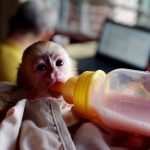 "It’s been really really great here. Everyone is so lovely and the monkeys are so so cute. Overall it’s been such a great trip and i’m very excited for my safari."
"It’s been really really great here. Everyone is so lovely and the monkeys are so so cute. Overall it’s been such a great trip and i’m very excited for my safari."
Jessi, 10 days February 2020
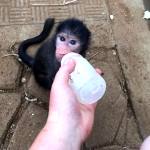 "I cannot thank you and Oyster enough. It was the most amazing beautiful experience ever. It kicked my ass but I will definitely be returning next year. You helped me so much and I am so grateful."
"I cannot thank you and Oyster enough. It was the most amazing beautiful experience ever. It kicked my ass but I will definitely be returning next year. You helped me so much and I am so grateful."
Mary Lee, 4 weeks November 2019
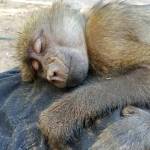 "We are having a very good time here. We are working hard but it is worth it, we are literally surrounded by monkeys! The atmosphere is really pleasant, everyone is willing to do the job and to do it properly. Besides, we know that we can ask as many questions as we want! After 2 weeks we feel much more comfortable so we are glad that we are staying 4 weeks."
"We are having a very good time here. We are working hard but it is worth it, we are literally surrounded by monkeys! The atmosphere is really pleasant, everyone is willing to do the job and to do it properly. Besides, we know that we can ask as many questions as we want! After 2 weeks we feel much more comfortable so we are glad that we are staying 4 weeks."
Laura, 4 weeks November 2019
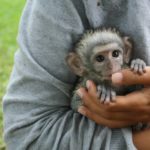 "It was the experience of a life-time for my 10-year old daughter who now can't wait to do more volunteering. We made many friends on
the project and many wonderful memories that we will cherish forever.!"
"It was the experience of a life-time for my 10-year old daughter who now can't wait to do more volunteering. We made many friends on
the project and many wonderful memories that we will cherish forever.!"
Jules, 2 weeks August 2019
 "I also can’t thank you enough for helping me prepare for it. The instructions were accurate and I had more than enough info to feel confident about going over. It was great being able to ask you any question or query I was apprehensive about and being able to rely on an answer within a few hours! My time overseas was amazing!"
"I also can’t thank you enough for helping me prepare for it. The instructions were accurate and I had more than enough info to feel confident about going over. It was great being able to ask you any question or query I was apprehensive about and being able to rely on an answer within a few hours! My time overseas was amazing!"
Stefanie, 2 weeks July 2019

"Georgie answered all of my queries extremely quickly which was brilliant. Also the Facebook page was very useful as I could chat to other volunteers before I got to the project and ask their advice. "
Rachel, 4 weeks June 2019
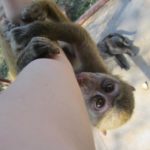 "I had the most amazing time overseas. I felt so at home. I'm missing it dearly already, bother the monkeys and the volunteers. I'm hoping to go back as soon as I can! Thank you so much for everything, it was unbelievable! "
"I had the most amazing time overseas. I felt so at home. I'm missing it dearly already, bother the monkeys and the volunteers. I'm hoping to go back as soon as I can! Thank you so much for everything, it was unbelievable! "
Kennedy, 4 weeks April 2019
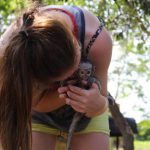 "Everything is going great, I absolutely love it here! I'm enjoying every minute, it's better than I had dared hope for. All the staff are great, very friendly and helpful. And the other volunteers are fantastic. The animals are, of course, adorable and I'm getting to know them quite well. One even jumped up to me on the baboon walk this morning and I carried her all the way to the pool which was a first :-)"
"Everything is going great, I absolutely love it here! I'm enjoying every minute, it's better than I had dared hope for. All the staff are great, very friendly and helpful. And the other volunteers are fantastic. The animals are, of course, adorable and I'm getting to know them quite well. One even jumped up to me on the baboon walk this morning and I carried her all the way to the pool which was a first :-)"
Rachel, 11 weeks April 2019
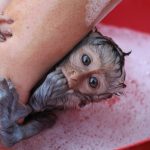 "It was a fantastic trip. The other volunteers were very sweet and we felt welcome from the start. I have seen a great development in my children and their English has improved a lot in the few weeks. Even though it was long working days from 6 am to 4 pm every day it has been great. It is actually very relaxing cutting fruits for 2 hours or more at the time - while you have the good long talks about life with your children or just enjoy to see them interact with the other volunteers in the work with the velvets and baboons."
"It was a fantastic trip. The other volunteers were very sweet and we felt welcome from the start. I have seen a great development in my children and their English has improved a lot in the few weeks. Even though it was long working days from 6 am to 4 pm every day it has been great. It is actually very relaxing cutting fruits for 2 hours or more at the time - while you have the good long talks about life with your children or just enjoy to see them interact with the other volunteers in the work with the velvets and baboons."
Tanja, 2 weeks February 2019
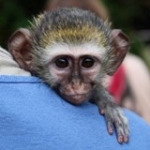 "The process of booking my trip and making it happen was extremely smooth. I was able to do it all within a week. It was really special to be able to work so closely with animals like monkeys and baboons every day."
"The process of booking my trip and making it happen was extremely smooth. I was able to do it all within a week. It was really special to be able to work so closely with animals like monkeys and baboons every day."
Sarah, 4 weeks December 2018
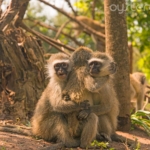 "We had a wonderful time. The whole trip was an unforgettable and wonderful experience where we met many amazing people from all over the world and were able to learn about the monkey‘s situations, needs and behavior. Everything went absolutely fine and this was the basis to make our experience an overall success!"
"We had a wonderful time. The whole trip was an unforgettable and wonderful experience where we met many amazing people from all over the world and were able to learn about the monkey‘s situations, needs and behavior. Everything went absolutely fine and this was the basis to make our experience an overall success!"
Andreas, 2 weeks March 2018
 "I had a fabulous time and I am already looking when I can go back! The sense of community there was wonderful, a home away from home, and even though the work was tough it was so rewarding when you saw the effect it had on the animals (as well as just cuddling them). Thank you very much for all your help with this project - I am very grateful."
"I had a fabulous time and I am already looking when I can go back! The sense of community there was wonderful, a home away from home, and even though the work was tough it was so rewarding when you saw the effect it had on the animals (as well as just cuddling them). Thank you very much for all your help with this project - I am very grateful."
Bryony, 1 week December 2017
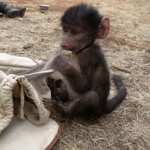 "I enjoyed my whole stay there, but I loved the trips and the amazing things we saw and experienced there. I also enjoyed the contact with the monkeys. Being able to actually feed them, carry them around, playing and cuddling with them. Thank you very much for the great communication!"
"I enjoyed my whole stay there, but I loved the trips and the amazing things we saw and experienced there. I also enjoyed the contact with the monkeys. Being able to actually feed them, carry them around, playing and cuddling with them. Thank you very much for the great communication!"
Floriane, 3 weeks October 2017
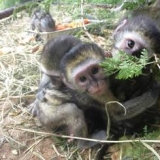 " I really have nothing to say on the oyster aspect. For real, your website and your organization is 1000 better than a lot that I have found on the internet. Everything is there and everything is so clear and my agent answer me really fast on the email that was really good and make me very more at ease about the project"
" I really have nothing to say on the oyster aspect. For real, your website and your organization is 1000 better than a lot that I have found on the internet. Everything is there and everything is so clear and my agent answer me really fast on the email that was really good and make me very more at ease about the project"
Florence, 4 weeks October 2017
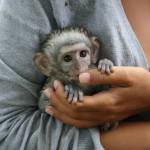 The pre-trip info on My Oyster was excellent very comprehensive and answered many questions and gave lots of advice regarding what to expect/items to pack. All arrangements regarding our stay and pick up ran smoothly and all the advice given regarding the project was accurate. My son, Louis, enjoyed the project so much he wants to return again next summer!"
The pre-trip info on My Oyster was excellent very comprehensive and answered many questions and gave lots of advice regarding what to expect/items to pack. All arrangements regarding our stay and pick up ran smoothly and all the advice given regarding the project was accurate. My son, Louis, enjoyed the project so much he wants to return again next summer!"
Deborah & Louis, 1 week September 2017
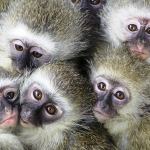 "The bond I formed with the animals and the other volunteers was much more emotional then I thought it would be. All the information I learnt was more then I expected and the leaders of the project where very open about their work and answered every question I had about these animals."
"The bond I formed with the animals and the other volunteers was much more emotional then I thought it would be. All the information I learnt was more then I expected and the leaders of the project where very open about their work and answered every question I had about these animals."
Megan, 4 weeks June 2017
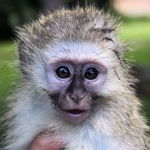 "I've been having a fabulous time becoming acquainted with people from all over the world here and learning all about the Vervet Monkeys and Baboons of South Africa! I can't believe that I have finally had the chance to explore the world of South Africa!"
"I've been having a fabulous time becoming acquainted with people from all over the world here and learning all about the Vervet Monkeys and Baboons of South Africa! I can't believe that I have finally had the chance to explore the world of South Africa!"
Katie, 4 weeks June 2017
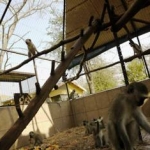 "It was a wonderful experience. It was a highlight meeting some amazing new people and being accepted into the family - despite being so much older than all the other volunteers. This was an amazing experience, and I'm so glad I plucked up the courage to go and do it. I've never volunteered before."
"It was a wonderful experience. It was a highlight meeting some amazing new people and being accepted into the family - despite being so much older than all the other volunteers. This was an amazing experience, and I'm so glad I plucked up the courage to go and do it. I've never volunteered before."
Sarah, 2 weeks May 2017
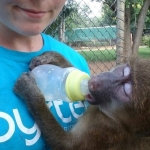 "The highlight - taking the baboons on river walks and seeing them play together in a large open space.Thanks to Anne for answering any questions I had whilst booking this trip."
"The highlight - taking the baboons on river walks and seeing them play together in a large open space.Thanks to Anne for answering any questions I had whilst booking this trip."
Ellis 2 weeks March 2017
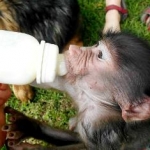 "Life changing doesn't even do it justice. Thank you isn't enough. Our time with the huge family of volunteers, monkeys, dogs, drake and more was overwhelmingly loving, and very worthwhile."
"Life changing doesn't even do it justice. Thank you isn't enough. Our time with the huge family of volunteers, monkeys, dogs, drake and more was overwhelmingly loving, and very worthwhile."
Jill, 2 weeks January 2017
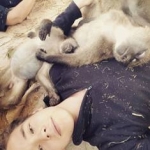 "My time was absolutely amazing. I've had the chance to bond with so many wonderful people and beautiful animals. It's so different being home again and so strange to adapt to the priorities of city life. Somehow people forgot that cuddling and grooming is top priority! Thank you for the opportunity and all the support!"
"My time was absolutely amazing. I've had the chance to bond with so many wonderful people and beautiful animals. It's so different being home again and so strange to adapt to the priorities of city life. Somehow people forgot that cuddling and grooming is top priority! Thank you for the opportunity and all the support!"
Andy, 4 weeks October 2016
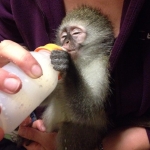 "The highlights were being able to work directly with the monkeys and build relationships with them, meeting and working alongside other like-minded volunteers and learning about animal behaviours. You gain a great knowledge about the monkeys in such a short period of time, and the time you spend with them is such a unique experience and almost therapeutic! "
"The highlights were being able to work directly with the monkeys and build relationships with them, meeting and working alongside other like-minded volunteers and learning about animal behaviours. You gain a great knowledge about the monkeys in such a short period of time, and the time you spend with them is such a unique experience and almost therapeutic! "
Francesca, 10 days August 2016
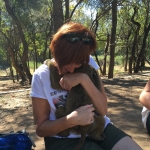 "Real 'hands on' work with monkeys. The project is properly organised with very dedicated staff and animal well-being is at the heart of what they do. I was able to go on a 2 day safari to Kruger (for an extra fee) which was stunning, as well as a one day trip to see more of the country's amazing landscape."
"Real 'hands on' work with monkeys. The project is properly organised with very dedicated staff and animal well-being is at the heart of what they do. I was able to go on a 2 day safari to Kruger (for an extra fee) which was stunning, as well as a one day trip to see more of the country's amazing landscape."
Amanda, 2 weeks August 2016
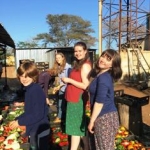 "We are having an amazing time! Everyone is so friendly and Joseph is loving it. The work they do here is fabulous; I am still a bit nervous about the baboons, but the smaller Vervets are wonderful. We have done all sorts, from food prep to collecting oranges and sitting on top of them on the ride back. The project hosts are lovely warm people - I just wish we were staying for longer."
"We are having an amazing time! Everyone is so friendly and Joseph is loving it. The work they do here is fabulous; I am still a bit nervous about the baboons, but the smaller Vervets are wonderful. We have done all sorts, from food prep to collecting oranges and sitting on top of them on the ride back. The project hosts are lovely warm people - I just wish we were staying for longer."
Vicky& Joseph, 2 weeks August 2016
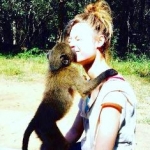 "I can honestly say the experience had a profound effect on me, definitely inspiring me to pursue a career in animal welfare. The preparation provided through Oyster is as good as you can get, and I owe you a lot for arranging the whole experience for me - I think as a company you are brilliant. Thanks again for everything you've done for me."
"I can honestly say the experience had a profound effect on me, definitely inspiring me to pursue a career in animal welfare. The preparation provided through Oyster is as good as you can get, and I owe you a lot for arranging the whole experience for me - I think as a company you are brilliant. Thanks again for everything you've done for me."
Tamzin, 4 weeks August 2016
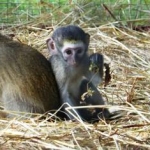 "Being able to see the physicality of what a 'love of animals' really means has been encompassed in everything that the sanctuary is and stands for, and I feel as if their commitment to the animals, and the laborious nature of their care, parallels and exceeds what I wanted to achieve at the project. This is nothing like I have ever done before in my life."
"Being able to see the physicality of what a 'love of animals' really means has been encompassed in everything that the sanctuary is and stands for, and I feel as if their commitment to the animals, and the laborious nature of their care, parallels and exceeds what I wanted to achieve at the project. This is nothing like I have ever done before in my life."
Liberty, 3 weeks July 2016
 "People of all ages should do this if they truly care about the welfare and future of these primates that don't have a voice! The centre relies on volunteers for both financial reasons and the sheer volume of the work load. And the work we do as volunteers is PRICELESS! The personal rewards are life changing."
"People of all ages should do this if they truly care about the welfare and future of these primates that don't have a voice! The centre relies on volunteers for both financial reasons and the sheer volume of the work load. And the work we do as volunteers is PRICELESS! The personal rewards are life changing."
Lorraine, 8 weeks May 2016
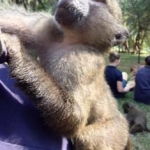 "The project was amazing - I met so many great people and still miss the baboons and vervet monkeys a lot. I'd love to go back one day. It was definitely the best experience I've had so far. Thanks again for everything."
"The project was amazing - I met so many great people and still miss the baboons and vervet monkeys a lot. I'd love to go back one day. It was definitely the best experience I've had so far. Thanks again for everything."
Rachel, 2 weeks May 2016
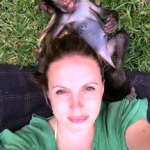 "I didn't know how much I would get out of this experience. It was a fantastic hands-on experience and I've learned some new skills. It is so easy to fall in love with them all, which makes it less like 'work' and more like spending time and having fun."
"I didn't know how much I would get out of this experience. It was a fantastic hands-on experience and I've learned some new skills. It is so easy to fall in love with them all, which makes it less like 'work' and more like spending time and having fun."
Penelope, 10 days March 2016
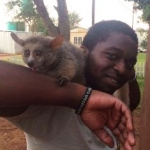 "It's been great - I really enjoyed my time at the sanctuary, it was one of the best experiences of my life and I'm in fact hoping to save up enough money to go back there for a year. I want to say a big thank you to you and the rest of the Oyster team for your help in preparing for this trip because I am ever so glad that I went."
"It's been great - I really enjoyed my time at the sanctuary, it was one of the best experiences of my life and I'm in fact hoping to save up enough money to go back there for a year. I want to say a big thank you to you and the rest of the Oyster team for your help in preparing for this trip because I am ever so glad that I went."
Kojo, 6 weeks March 2016
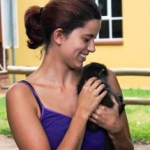 "By participating wholeheartedly in all the activities, I was able to determine new boundaries and limits for myself and see what sort of a person I could be when pushed out of my comfort zone. It is also an incredible project to really get involved in - the rehabilitation of the primates, and an excellent way to work in a very hands-on manner with the animals."
"By participating wholeheartedly in all the activities, I was able to determine new boundaries and limits for myself and see what sort of a person I could be when pushed out of my comfort zone. It is also an incredible project to really get involved in - the rehabilitation of the primates, and an excellent way to work in a very hands-on manner with the animals."
Hanna, 12 weeks January 2016
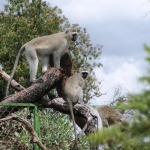 "It truly was the most amazing experience that I will never forget. The sanctuary hosts are remarkable people, and I admire their ethics and total devotion to the project. I am going to be looking into a career with the rehabilitation of animals or helping animals in some way. I've always loved animals, especially monkeys, and this has certainly spurred me on to do that."
"It truly was the most amazing experience that I will never forget. The sanctuary hosts are remarkable people, and I admire their ethics and total devotion to the project. I am going to be looking into a career with the rehabilitation of animals or helping animals in some way. I've always loved animals, especially monkeys, and this has certainly spurred me on to do that."
Jaz, 3 weeks March 2016
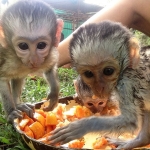 "I loved almost every second! Making amazing friends, feeling completely immersed in the lifestyle and looking after such an incredible species hands-on. It's so much fun! I learnt so much about myself and others, including about the native culture and other volunteers' cultures. Thank you for helping me organise the experience of a lifetime!"
"I loved almost every second! Making amazing friends, feeling completely immersed in the lifestyle and looking after such an incredible species hands-on. It's so much fun! I learnt so much about myself and others, including about the native culture and other volunteers' cultures. Thank you for helping me organise the experience of a lifetime!"
Emily, 2 weeks February 2016
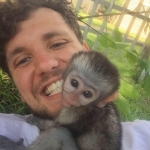 "I had very high expectations for the trip but it exceeded all of them in every way. I felt like I was making a difference every single day. Having some one-on-one time, and developing bonds with the animals and seeing how they became more comfortable with you everyday, was priceless."
"I had very high expectations for the trip but it exceeded all of them in every way. I felt like I was making a difference every single day. Having some one-on-one time, and developing bonds with the animals and seeing how they became more comfortable with you everyday, was priceless."
Dominic, 4 weeks January 2016
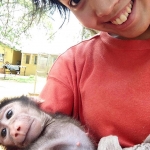 "The people here are amazing and the babies are super cute. We have around 25 babies at the moment which is just so cool! It's very hard to tell them apart though - I think I can recognise about a third of them so far!"
"The people here are amazing and the babies are super cute. We have around 25 babies at the moment which is just so cool! It's very hard to tell them apart though - I think I can recognise about a third of them so far!"
Hannah, 12 weeks January 2016
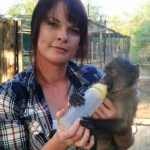 "I absolutely loved my time looking after the monkeys and getting stuck into the work. I really enjoyed my time there - it was hard work and hot but it’s exactly what I was expecting. The sanctuary hosts were amazing, and I am truly inspired by their dedication."
"I absolutely loved my time looking after the monkeys and getting stuck into the work. I really enjoyed my time there - it was hard work and hot but it’s exactly what I was expecting. The sanctuary hosts were amazing, and I am truly inspired by their dedication."
Joanne, 2 weeks November 2015
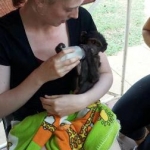 "The management were amazing, very welcoming and friendly. I loved the hands on experience, learning new skills and knowledge, and sighting some South African animals on Safari."
"The management were amazing, very welcoming and friendly. I loved the hands on experience, learning new skills and knowledge, and sighting some South African animals on Safari."
Amelia, 2 weeks September 2015
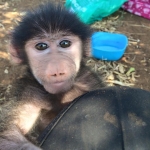 "The trip was amazing - I really enjoyed both working with the baboons and spending time with the other volunteers, and I was really sad to leave at the end. Thanks a lot for helping me to choose and get ready for the project, it was an incredible experience."
"The trip was amazing - I really enjoyed both working with the baboons and spending time with the other volunteers, and I was really sad to leave at the end. Thanks a lot for helping me to choose and get ready for the project, it was an incredible experience."
Miles, 3 weeks September 2015
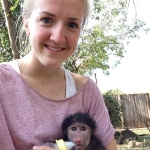 "My time in South Africa was absolutely amazing and I can't believe it's all over! I really miss the monkeys and baboons... and the other volunteers obviously. It was an incredible experience, I learnt so much and have some great memories."
"My time in South Africa was absolutely amazing and I can't believe it's all over! I really miss the monkeys and baboons... and the other volunteers obviously. It was an incredible experience, I learnt so much and have some great memories."
Lizy, 4 weeks September 2015
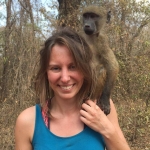 "It was a very good experience for me, especially for my personal development. It was indeed very hands-on. There were very many positive moments, meeting very nice people, including the sanctuary hosts, going to Kruger park, enjoying the Saturday night braai's, going to town with the truck...Thank you very much for your personal support!"
"It was a very good experience for me, especially for my personal development. It was indeed very hands-on. There were very many positive moments, meeting very nice people, including the sanctuary hosts, going to Kruger park, enjoying the Saturday night braai's, going to town with the truck...Thank you very much for your personal support!"
Cynthia, 3 weeks August 2015
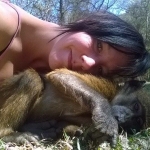 "I met a lot of amazing new people, and learned about different cultures. I really helped to do something good. Making a strong bond with one specific baboon was my number one highlight. It's great fun and very rewarding - enjoy every moment and don't skip out on any opportunities you have. Thank you very much, I couldn't have done it without Oyster."
"I met a lot of amazing new people, and learned about different cultures. I really helped to do something good. Making a strong bond with one specific baboon was my number one highlight. It's great fun and very rewarding - enjoy every moment and don't skip out on any opportunities you have. Thank you very much, I couldn't have done it without Oyster."
Catherine, 6 weeks August 2015
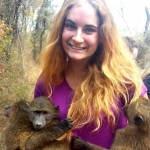 "We really had an amazing experience. It was so well organised and everyone we met there was so lovely and down to earth. Thank you for organising everything!"
"We really had an amazing experience. It was so well organised and everyone we met there was so lovely and down to earth. Thank you for organising everything!"
Amelia, 2 weeks August 2015
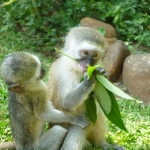 "I loved spending time with the monkeys and meeting lots of amazing people from around the world. It is a great way to meet new people and learn about other parts of the world whilst working for a worthwhile cause with a definite cute factor."
"I loved spending time with the monkeys and meeting lots of amazing people from around the world. It is a great way to meet new people and learn about other parts of the world whilst working for a worthwhile cause with a definite cute factor."
Rachel, 2 weeks July 2015
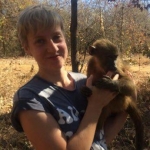 "I loved every aspect, from the hard work to the people, not to mention the animals. Caring for the baboons and being part of the team to look after them was brilliant. Everyone made an important contribution to the project."
"I loved every aspect, from the hard work to the people, not to mention the animals. Caring for the baboons and being part of the team to look after them was brilliant. Everyone made an important contribution to the project."
Hannah, 2 weeks July 2015
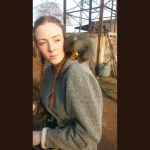 "I'm having a really good time. The place is lovely, the sanctuary hosts are very kind and welcoming, and I am leaving on Monday after a wonderful month in South Africa. Thanks for all your help."
"I'm having a really good time. The place is lovely, the sanctuary hosts are very kind and welcoming, and I am leaving on Monday after a wonderful month in South Africa. Thanks for all your help."
Katie, 4 weeks July 2015
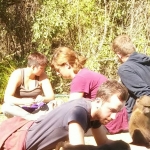 "I can honestly say it was the best experience of my life, and I was so sad to leave! It was so much better than I could have ever imagined. I have so many good photos - I just keep looking at them everyday. I’m currently just working at the moment and trying to save some money, and hoping the blues wear off!"
"I can honestly say it was the best experience of my life, and I was so sad to leave! It was so much better than I could have ever imagined. I have so many good photos - I just keep looking at them everyday. I’m currently just working at the moment and trying to save some money, and hoping the blues wear off!"
Luke, 4 weeks July 2015
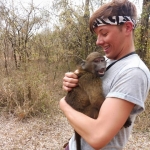 "South Africa was beautiful. I honestly had the best two weeks of my life. Now I'm back, I've asked for a career break from work for a year so I can travel more and volunteer again on this project. Thanks for the opportunity! Really the best time."
"South Africa was beautiful. I honestly had the best two weeks of my life. Now I'm back, I've asked for a career break from work for a year so I can travel more and volunteer again on this project. Thanks for the opportunity! Really the best time."
Tom, 2 weeks July 2015
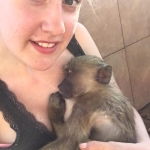 "After my last South Africa trip through Oyster my expectations were really high, but this project definitely lived up to it! It was such an incredible experience interacting with the monkeys daily, especially when they began to recognise you and become more playful! I really didn't want to leave!"
"After my last South Africa trip through Oyster my expectations were really high, but this project definitely lived up to it! It was such an incredible experience interacting with the monkeys daily, especially when they began to recognise you and become more playful! I really didn't want to leave!"
Hannah, 4 weeks June 2015
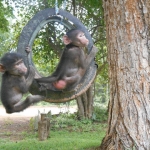 "We had a wonderful time in South Africa and we are now definitely missing the overall team and lovely monkeys out there! We also had the chance to visit Kruger Park, and it was absolutely fantastic to watch the beautiful wildlife living in the park!"
"We had a wonderful time in South Africa and we are now definitely missing the overall team and lovely monkeys out there! We also had the chance to visit Kruger Park, and it was absolutely fantastic to watch the beautiful wildlife living in the park!"
Sohely, 2 weeks April 2015
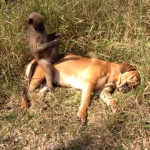 "I had a great time in South Africa. It was amazing working with the monkeys. If you love animals you'll love this volunteer work. You can't help but fall in love with them. Amazing work. Well done!"
"I had a great time in South Africa. It was amazing working with the monkeys. If you love animals you'll love this volunteer work. You can't help but fall in love with them. Amazing work. Well done!"
Laura, 1 week March 2015
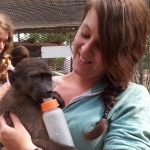 "Getting to handle monkeys and really see them and learn about them, meeting new people and learning about their background were the real highlights of this trip. Thank you so much for everything; I wouldn't have done that trip if I was slightly worried, but I had no concerns at all as Anne was there whenever I needed to ask a question or just talk about the trip."
"Getting to handle monkeys and really see them and learn about them, meeting new people and learning about their background were the real highlights of this trip. Thank you so much for everything; I wouldn't have done that trip if I was slightly worried, but I had no concerns at all as Anne was there whenever I needed to ask a question or just talk about the trip."
Emma, 4 weeks March 2015
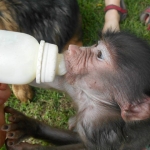 "South Africa was just amazing! The sanctuary hosts are two incredible people; thanks to them we were all feeling at home and got a 2nd family. I wish I could have stayed longer - it was really hard to say goodbye. I learnt so much and am really proud to have lived this experience."
"South Africa was just amazing! The sanctuary hosts are two incredible people; thanks to them we were all feeling at home and got a 2nd family. I wish I could have stayed longer - it was really hard to say goodbye. I learnt so much and am really proud to have lived this experience."
Yasmine, 2 weeks March 2015
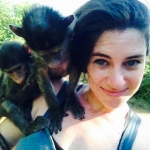 "I loved the monkeys and baboons, and I like the way the facility is run. Swimming with baboons, having time to bond with the monkeys and baboons, and preparing food and bottles for them was just great. Go into it with an open mind!"
"I loved the monkeys and baboons, and I like the way the facility is run. Swimming with baboons, having time to bond with the monkeys and baboons, and preparing food and bottles for them was just great. Go into it with an open mind!"
Sara, 2 weeks February 2015
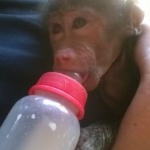 "We had a really rewarding time and loved being with the monkeys. We met some fantastic people, both volunteers like us and workers out there - everyone made us feel very welcome. We are definitely missing some of our special little monkey friends."
"We had a really rewarding time and loved being with the monkeys. We met some fantastic people, both volunteers like us and workers out there - everyone made us feel very welcome. We are definitely missing some of our special little monkey friends."
Louise, 2 weeks January 2015
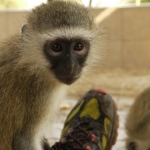 " Just want to say thank you so much for all your help with booking this trip and for being really easy to talk to about the smallest little things. It felt nice to know you were there if we needed you. I really enjoyed booking through Oyster and I'm sure I will do again in the (hopefully) near future!"
" Just want to say thank you so much for all your help with booking this trip and for being really easy to talk to about the smallest little things. It felt nice to know you were there if we needed you. I really enjoyed booking through Oyster and I'm sure I will do again in the (hopefully) near future!"
Alice, 2 weeks January 2015
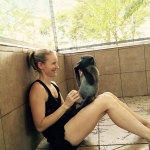 "My trip was amazing. It's possibly the best thing I've ever done. I'm definitely missing the monkeys. I knew it was going to be hands on, but I didn't know the extent, and I really couldn't have hoped for a better experience. All the people I met were great, the first couple of days are overwhelming, but once I got past that, I really felt comfortable there and had such a great time."
"My trip was amazing. It's possibly the best thing I've ever done. I'm definitely missing the monkeys. I knew it was going to be hands on, but I didn't know the extent, and I really couldn't have hoped for a better experience. All the people I met were great, the first couple of days are overwhelming, but once I got past that, I really felt comfortable there and had such a great time."
Katie, 2 weeks December 2014
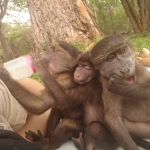 "It's good to have different experiences in life. The staff were very helpful, nothing was too much trouble for them. Expect to do some very dirty work, and to get very messy. Well worth volunteering, no matter what age you are!"
"It's good to have different experiences in life. The staff were very helpful, nothing was too much trouble for them. Expect to do some very dirty work, and to get very messy. Well worth volunteering, no matter what age you are!"
Julie, 4 weeks November 2014
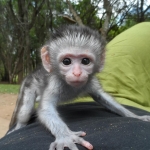 "I'm already missing the monkeys! It's such a special place - it really does feel like home after a while and I could have stayed much longer! I really enjoyed helping the team and being a part of such a great group of volunteers."
"I'm already missing the monkeys! It's such a special place - it really does feel like home after a while and I could have stayed much longer! I really enjoyed helping the team and being a part of such a great group of volunteers."
Chris, 3 weeks November 2014
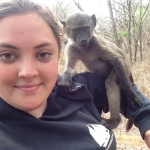 "My time in South Africa was amazing! Thank you so much for everything you've done for me, I couldn't have asked for a better experience! Other people should do this because it will not be something that they will regret. The amount I learnt in such a short time is incredible - I can't imagine the things I would have learnt if I had been there longer (I wish I had stayed longer!)"
"My time in South Africa was amazing! Thank you so much for everything you've done for me, I couldn't have asked for a better experience! Other people should do this because it will not be something that they will regret. The amount I learnt in such a short time is incredible - I can't imagine the things I would have learnt if I had been there longer (I wish I had stayed longer!)"
Joanne, 4 weeks October 2014
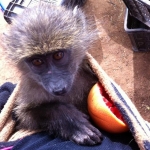 "The two main highlights for me were looking after the baby baboons and going to Kruger National Park. If you enjoy working with animals, and love the thought of having monkeys climbing all over you, then you would definitely enjoy this project. I had a brilliant time working with the monkeys and I met some wonderful people."
"The two main highlights for me were looking after the baby baboons and going to Kruger National Park. If you enjoy working with animals, and love the thought of having monkeys climbing all over you, then you would definitely enjoy this project. I had a brilliant time working with the monkeys and I met some wonderful people."
Ruth, 4 weeks October 2014
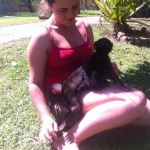 "The whole trip was amazing. We didn't want to leave. We met some amazing people and some even more amazing monkeys! I miss them so much... I'm definitely going back there one day!! Thank you so much."
"The whole trip was amazing. We didn't want to leave. We met some amazing people and some even more amazing monkeys! I miss them so much... I'm definitely going back there one day!! Thank you so much."
Jess, 2 weeks September 2014
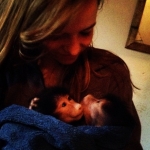 "We had the most amazing experience in South Africa - the centre was incredible and we had so much fun there. The monkeys and baboons were so adorable and we met some great people. We wished we could have stayed for longer. Thank you very much for all your help for preparing us before we went, we really appreciate it!"
"We had the most amazing experience in South Africa - the centre was incredible and we had so much fun there. The monkeys and baboons were so adorable and we met some great people. We wished we could have stayed for longer. Thank you very much for all your help for preparing us before we went, we really appreciate it!"
Lizzy, 2 weeks August 2014
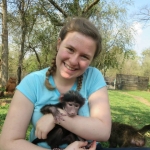 "Thank you so much for helping me with my trip! I had such an amazing time and met such amazing people! Thank you for everything! I will never forget my time in South Africa, I can't believe it is over!"
"Thank you so much for helping me with my trip! I had such an amazing time and met such amazing people! Thank you for everything! I will never forget my time in South Africa, I can't believe it is over!"
Rose, 2 weeks August 2014
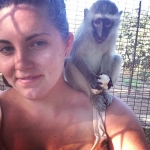 "I had an absolutely amazing time!! Yes, deffo missing the monkeys. Especially the little 2 week old ones that arrived while I was there! I truly had an amazing experience and thanks for all your help."
"I had an absolutely amazing time!! Yes, deffo missing the monkeys. Especially the little 2 week old ones that arrived while I was there! I truly had an amazing experience and thanks for all your help."
Amanda, 2 weeks August 2014
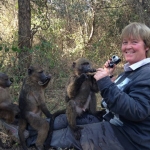 "The trip suited me down to the ground and I don’t think I’ve known 3 weeks pass so fast. I love the concept of a working holiday as sitting on a beach has never been my thing. I met some extremely special people of all ages, and enjoyed the fact it didn’t matter who we were, where we came from or how old we were, we were all there to do an important job."
"The trip suited me down to the ground and I don’t think I’ve known 3 weeks pass so fast. I love the concept of a working holiday as sitting on a beach has never been my thing. I met some extremely special people of all ages, and enjoyed the fact it didn’t matter who we were, where we came from or how old we were, we were all there to do an important job."
Sara, 3 weeks July 2014
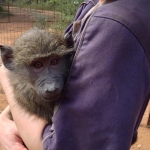 "I am so glad to be home after a couple months away, but I miss Africa already. It was a really amazing experience - I learnt a lot about myself. I plan now to focus on my last year of high school and hopefully to study veterinary medicine in college soon :) Thank you!"
"I am so glad to be home after a couple months away, but I miss Africa already. It was a really amazing experience - I learnt a lot about myself. I plan now to focus on my last year of high school and hopefully to study veterinary medicine in college soon :) Thank you!"
Jasmine, 2 weeks July 2014
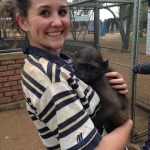 "South Africa was incredible.We also lucky to have been there around the time of the release of a troop of vervets - Holly and I were part of the team taken to the release site to make the final arrangements, and they have now taken the troop out!"
"South Africa was incredible.We also lucky to have been there around the time of the release of a troop of vervets - Holly and I were part of the team taken to the release site to make the final arrangements, and they have now taken the troop out!"
Zoe, 2 weeks July 2014
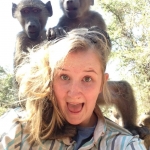 "I will definitely be looking into doing more volunteer work with animals in the future. Not only is it a fantastic experience, but it's great value for money, and you are getting a trip where you come away feeling a sense of achievement, as you have made a huge difference to the centre, which would struggle to run without the volunteers."
"I will definitely be looking into doing more volunteer work with animals in the future. Not only is it a fantastic experience, but it's great value for money, and you are getting a trip where you come away feeling a sense of achievement, as you have made a huge difference to the centre, which would struggle to run without the volunteers."
Holly, 2 weeks July 2014
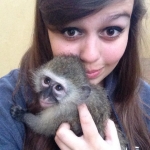 "You really need to spend a month there to get the most out of it. Get excited to spend time with a whole variety of different people because it's so much fun :D Everything was a lot more relaxed and fun than I was expecting. Wish I'd stayed longer!"
"You really need to spend a month there to get the most out of it. Get excited to spend time with a whole variety of different people because it's so much fun :D Everything was a lot more relaxed and fun than I was expecting. Wish I'd stayed longer!"
Megan, 2 weeks July 2014
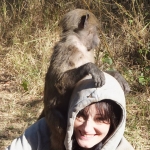 "Our time was challenging and hard work, but we learnt a lot about the monkeys AND about ourselves and it’s been an enriching experience. We met some great new friends and have some amazing photos. Thank you!"
"Our time was challenging and hard work, but we learnt a lot about the monkeys AND about ourselves and it’s been an enriching experience. We met some great new friends and have some amazing photos. Thank you!"
Angela and Phil, 2 weeks July 2014
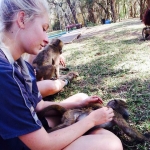 "Highlights included bottle feeding the babies throughout the day, taking the baboons to the pool, getting to sit and play in the baby cages, visiting the release site where the Vervet group would be released, being able to sit and watch the main Baboon camp and see the adults interact and go about their daily lives, and the social evenings with the other volunteers."
"Highlights included bottle feeding the babies throughout the day, taking the baboons to the pool, getting to sit and play in the baby cages, visiting the release site where the Vervet group would be released, being able to sit and watch the main Baboon camp and see the adults interact and go about their daily lives, and the social evenings with the other volunteers."
Charlotte, 8 weeks May 2014
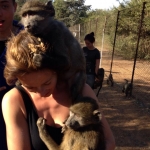 "An amazing opportunity to be around such fascinating monkeys and really spend time with them and interact with them. I can't believe how rewarding the release was - I did this in my last week and it was such an emotional and amazing time to be part of actually releasing these wild animals back in to their natural habitat, where they belong."
"An amazing opportunity to be around such fascinating monkeys and really spend time with them and interact with them. I can't believe how rewarding the release was - I did this in my last week and it was such an emotional and amazing time to be part of actually releasing these wild animals back in to their natural habitat, where they belong."
Cheryl, 6 weeks May 2014
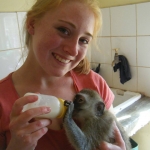 "I have had a great time – even better than I expected! The project itself is very worthwhile and we had so much hands-on experience. I enjoyed meeting a variety of different people from different countries and cultures. The set up there is very welcoming and everyone works as a team. Thank you so much for all your help, it really was a fabulous trip."
"I have had a great time – even better than I expected! The project itself is very worthwhile and we had so much hands-on experience. I enjoyed meeting a variety of different people from different countries and cultures. The set up there is very welcoming and everyone works as a team. Thank you so much for all your help, it really was a fabulous trip."
Harriet, 6 weeks, May 2014
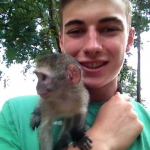 "I really enjoyed it out there - probably one of the best, if not the best, month of my life. I've got some really great memories and some really good friends out of it. I'm missing the monkeys and the lifestyle already. It was a really good experience that I'm never going to forget."
"I really enjoyed it out there - probably one of the best, if not the best, month of my life. I've got some really great memories and some really good friends out of it. I'm missing the monkeys and the lifestyle already. It was a really good experience that I'm never going to forget."
Liam, 4 weeks, April 2014
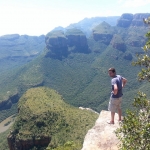 "I really enjoyed the experience and am already trying to plan a date for when I can go back. The people were all really nice and accommodating, and I miss them and the volunteers more than the monkeys."
"I really enjoyed the experience and am already trying to plan a date for when I can go back. The people were all really nice and accommodating, and I miss them and the volunteers more than the monkeys."
Laurence 2 weeks, March 2014
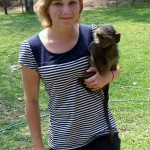 "I soon learned the routine, fitted in and loved every moment. I feel I grew as an individual, gained life experience and had the most incredible month of my life.Thank you very much for making this experience possible, it is certainly a trip I will never forget and has gave me many amazing memories."
"I soon learned the routine, fitted in and loved every moment. I feel I grew as an individual, gained life experience and had the most incredible month of my life.Thank you very much for making this experience possible, it is certainly a trip I will never forget and has gave me many amazing memories."
Charlotte, 4 weeks, August 2013
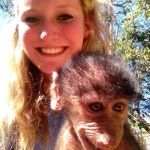 "South Africa was incredible. Such an experience. Thanks for helping me sort it all out. The monkeys were so fun to work with and it's so hands on that you actually get to play with them and even take them to shower with you. I had a really good time and got to see a bit of the country as well."
"South Africa was incredible. Such an experience. Thanks for helping me sort it all out. The monkeys were so fun to work with and it's so hands on that you actually get to play with them and even take them to shower with you. I had a really good time and got to see a bit of the country as well."
Eleanor, 2 weeks August 2013
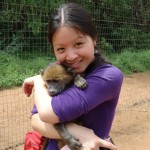 “The 3 weeks with the monkeys were amazing - I have never had such a brilliant and hands on time with animals before in my life. The monkeys were beautiful - I totally fell in love with the baboons, as well as with a 1 month old baby Samango monkey who arrived 3 days before my departure. It was an experience of a lifetime and I am so glad to have done it!”
“The 3 weeks with the monkeys were amazing - I have never had such a brilliant and hands on time with animals before in my life. The monkeys were beautiful - I totally fell in love with the baboons, as well as with a 1 month old baby Samango monkey who arrived 3 days before my departure. It was an experience of a lifetime and I am so glad to have done it!”
Lee, 3 weeks February 2013
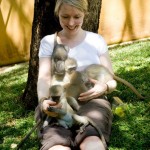 "If you care about animals, and are prepared to work hard but also to join in and be sociable with other volunteers (there’s a lovely atmosphere there), then it’s an amazing opportunity."
"If you care about animals, and are prepared to work hard but also to join in and be sociable with other volunteers (there’s a lovely atmosphere there), then it’s an amazing opportunity."
Charlotte, 2 weeks March 2012
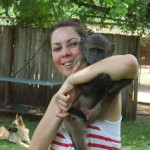 “I am so glad that I got a chance to spend time with the baboons, they are incredible; how can you not fall in love with each and every one of them, even Yopi who has a habit of using your hair as a bungee jump! The reps were brilliant and very knowledgeable. Thanks again for all your help - best experience ever.”
“I am so glad that I got a chance to spend time with the baboons, they are incredible; how can you not fall in love with each and every one of them, even Yopi who has a habit of using your hair as a bungee jump! The reps were brilliant and very knowledgeable. Thanks again for all your help - best experience ever.”
Sarah, 2 weeks November 2011
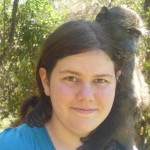 “The placement was fantastic. I was able to work with and learn about primates, which was exactly what I expected. I enjoyed it immensely and value the experience. Go with an open mind, prepared to enjoy yourself. Don’t take clothes you care about too much, and remember that monkeys like to play with jewellery, so be careful!”
“The placement was fantastic. I was able to work with and learn about primates, which was exactly what I expected. I enjoyed it immensely and value the experience. Go with an open mind, prepared to enjoy yourself. Don’t take clothes you care about too much, and remember that monkeys like to play with jewellery, so be careful!”
Lucrezia, 2 weeks September 2011
“The p
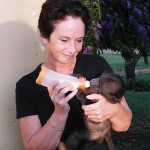 roject more than lived up to my expectations. It really is quite surreal to go for a walk with 5 baboons, 2 vervets and 5 or 6 dogs, but that was my daily experience there. Being able to get so close to the monkeys and baboons was very special - they were real characters and it's great to know that one day they will be released as part of a large troop.”
roject more than lived up to my expectations. It really is quite surreal to go for a walk with 5 baboons, 2 vervets and 5 or 6 dogs, but that was my daily experience there. Being able to get so close to the monkeys and baboons was very special - they were real characters and it's great to know that one day they will be released as part of a large troop.”
Catherine, 6 weeks September 2011
For more information on this great project, see our baboon and monkey rehabilitation webpage. friends
Got a question or want to chat to Project Manager Kate who has first-hand experience of the project? Call +44 (0) 1892 771 973or email: – [email protected].






